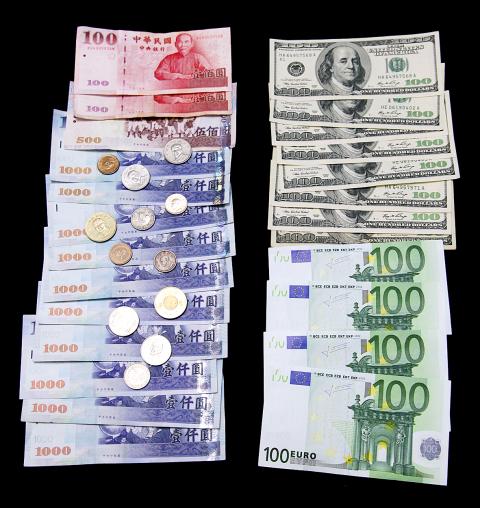Central bank Governor Perng Fai-nan (彭淮南) yesterday said the currency clearing agreement between Taiwan and China may take effect before the Lunar New Year, which falls in February next year.
Meanwhile, the Financial Supervisory Commission is to send an official letter to local banks today or tomorrow that would allow them to do onshore business in yuan, a commission official said by telephone yesterday.
Perng made the remark after the People’s Bank of China on Tuesday appointed the Taipei branch of Bank of China Ltd (中國銀行) as its clearing bank for yuan trading in Taiwan, a critical step in pushing forward the memorandum of understanding for cross-strait currency settlement signed on Aug. 31.

Photo: EPA
Earlier in September, the Chinese central bank appointed the Bank of Taiwan’s (台灣銀行) branch in Shanghai as the New Taiwan dollar clearing bank in China.
At a meeting of the Finance Committee at the legislature yesterday, Perng said he met officials from the Taipei branch of Bank of China late on Tuesday. He said he hoped the Chinese bank would accelerate follow-up procedures for the yuan settlement.
“The next step now is for clearing banks on both sides to sign a currency settlement agreement,” Perng said in a question-and-answer session at the committee.
It may take about a month for such an agreement to take effect, Perng said, adding that he expects domestic banking units in Taiwan to officially launch onshore yuan trading by the Lunar New Year.
However, both sides still need further discussion to determine the quota of yuan Taiwanese banks can process on a daily basis, Perng said, in response to Chinese Nationalist Party (KMT) Legislator Alex Fai’s (費鴻泰) request that the Taiwanese central bank should strive to attain at least the same quota of yuan trading as Hong Kong.
“From our perspective, the higher the quota, the better,” Perng said.
Currently, the maximum daily quota for yuan deposits in Hong Kong is 20,000 yuan (US$3,180), with remittances on a daily basis restricted no more than 80,000 yuan.
Perng said the central bank would watch future interest rates of yuan deposits in Taiwan to make sure the rates are not significantly different than rates for the NT dollar deposits to maintain a “normal status” in the local banking sector.
Meanwhile, the central bank maintained a relatively optimistic outlook on the global economy, Perng said, adding that many international and domestic economic institutes have forecast more than 3 percent GDP growth for Taiwan next year.
As for the recent net inflows from foreign investors, Perng said he had seen some sovereign wealth funds enter Taiwan and invest in the securities market.
Net inflows of foreign investment have reached US$1.4 billion since Dec. 1, compared with last month’s US$1.26 billion in net inflows, Perng added.

ROLLER-COASTER RIDE: More than five earthquakes ranging from magnitude 4.4 to 5.5 on the Richter scale shook eastern Taiwan in rapid succession yesterday afternoon Back-to-back weather fronts are forecast to hit Taiwan this week, resulting in rain across the nation in the coming days, the Central Weather Administration said yesterday, as it also warned residents in mountainous regions to be wary of landslides and rockfalls. As the first front approached, sporadic rainfall began in central and northern parts of Taiwan yesterday, the agency said, adding that rain is forecast to intensify in those regions today, while brief showers would also affect other parts of the nation. A second weather system is forecast to arrive on Thursday, bringing additional rain to the whole nation until Sunday, it

LANDSLIDES POSSIBLE: The agency advised the public to avoid visiting mountainous regions due to more expected aftershocks and rainfall from a series of weather fronts A series of earthquakes over the past few days were likely aftershocks of the April 3 earthquake in Hualien County, with further aftershocks to be expected for up to a year, the Central Weather Administration (CWA) said yesterday. Based on the nation’s experience after the quake on Sept. 21, 1999, more aftershocks are possible over the next six months to a year, the agency said. A total of 103 earthquakes of magnitude 4 on the local magnitude scale or higher hit Hualien County from 5:08pm on Monday to 10:27am yesterday, with 27 of them exceeding magnitude 5. They included two, of magnitude

CONDITIONAL: The PRC imposes secret requirements that the funding it provides cannot be spent in states with diplomatic relations with Taiwan, Emma Reilly said China has been bribing UN officials to obtain “special benefits” and to block funding from countries that have diplomatic ties with Taiwan, a former UN employee told the British House of Commons on Tuesday. At a House of Commons Foreign Affairs Committee hearing into “international relations within the multilateral system,” former Office of the UN High Commissioner for Human Rights (OHCHR) employee Emma Reilly said in a written statement that “Beijing paid bribes to the two successive Presidents of the [UN] General Assembly” during the two-year negotiation of the Sustainable Development Goals. Another way China exercises influence within the UN Secretariat is

Taiwan’s first drag queen to compete on the internationally acclaimed RuPaul’s Drag Race, Nymphia Wind (妮妃雅), was on Friday crowned the “Next Drag Superstar.” Dressed in a sparkling banana dress, Nymphia Wind swept onto the stage for the final, and stole the show. “Taiwan this is for you,” she said right after show host RuPaul announced her as the winner. “To those who feel like they don’t belong, just remember to live fearlessly and to live their truth,” she said on stage. One of the frontrunners for the past 15 episodes, the 28-year-old breezed through to the final after weeks of showcasing her unique